Foundation Management: AI's Role in Decision Making Process
VerifiedAdded on 2023/01/19
|7
|1987
|72
Report
AI Summary
This report delves into the increasing significance of Artificial Intelligence (AI) in management decision-making processes. It explores AI's influence on key managerial functions such as planning, organizing, leading, and controlling, highlighting its ability to enhance resource management, improve operational efficiency, and facilitate data-driven decision-making. The report examines the advantages of AI, including fact-based results, quick decision-making, and improved accuracy, alongside its disadvantages, such as a lack of innovation and potential ethical concerns. It also discusses the impact of AI on financial decisions and future predictions. The report concludes with recommendations for ethical AI implementation, suggesting the integration of AI in processes like quality and resource management. Furthermore, it stresses the importance of using comprehensive datasets, including data from strategic partners, to optimize AI's effectiveness in managerial contexts. The report emphasizes the transformative potential of AI in modern business environments, providing valuable insights for managers and organizations seeking to leverage AI for improved performance and strategic advantage.

FOUNDATION
MANAGEMENT
MANAGEMENT
Paraphrase This Document
Need a fresh take? Get an instant paraphrase of this document with our AI Paraphraser
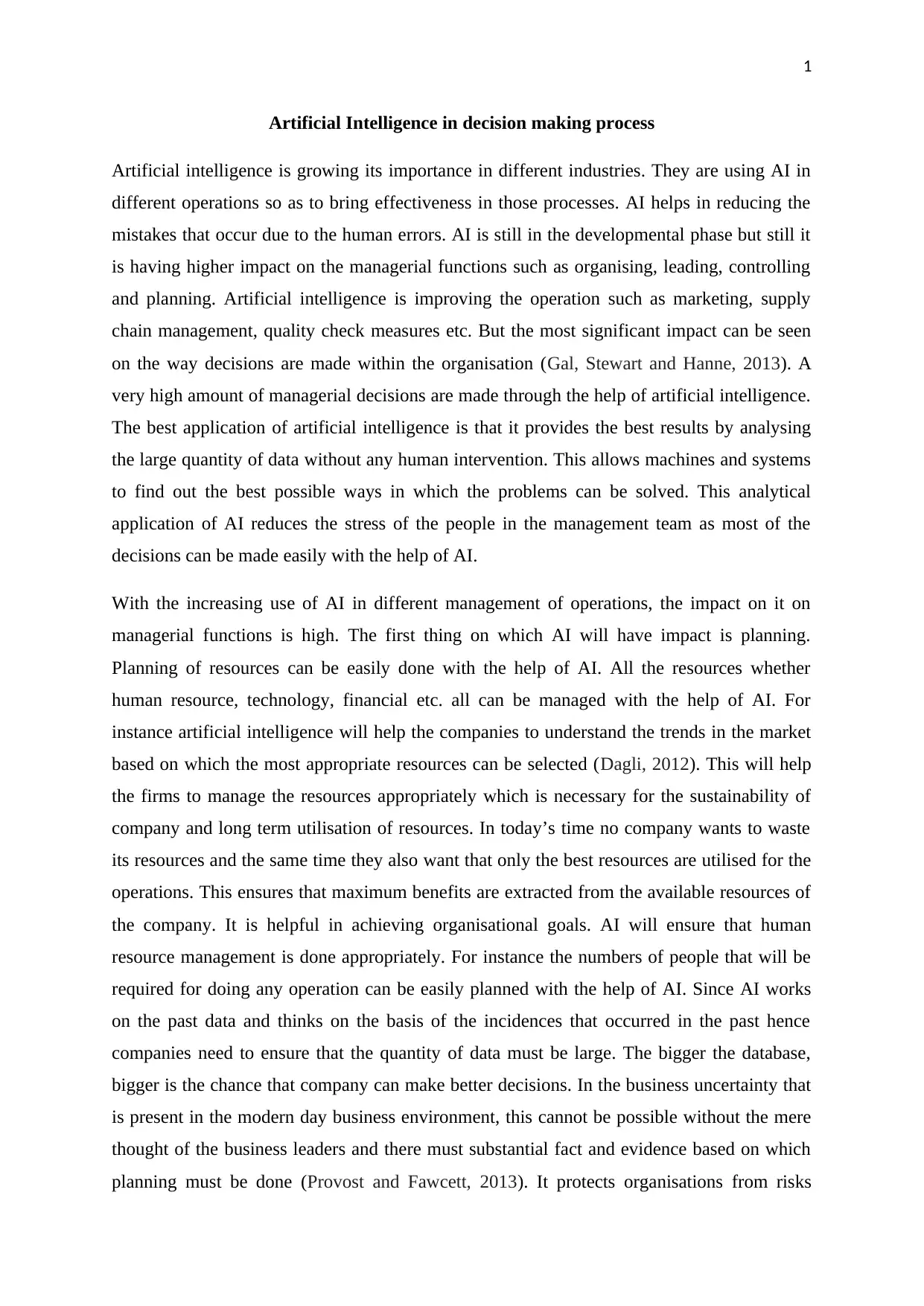
1
Artificial Intelligence in decision making process
Artificial intelligence is growing its importance in different industries. They are using AI in
different operations so as to bring effectiveness in those processes. AI helps in reducing the
mistakes that occur due to the human errors. AI is still in the developmental phase but still it
is having higher impact on the managerial functions such as organising, leading, controlling
and planning. Artificial intelligence is improving the operation such as marketing, supply
chain management, quality check measures etc. But the most significant impact can be seen
on the way decisions are made within the organisation (Gal, Stewart and Hanne, 2013). A
very high amount of managerial decisions are made through the help of artificial intelligence.
The best application of artificial intelligence is that it provides the best results by analysing
the large quantity of data without any human intervention. This allows machines and systems
to find out the best possible ways in which the problems can be solved. This analytical
application of AI reduces the stress of the people in the management team as most of the
decisions can be made easily with the help of AI.
With the increasing use of AI in different management of operations, the impact on it on
managerial functions is high. The first thing on which AI will have impact is planning.
Planning of resources can be easily done with the help of AI. All the resources whether
human resource, technology, financial etc. all can be managed with the help of AI. For
instance artificial intelligence will help the companies to understand the trends in the market
based on which the most appropriate resources can be selected (Dagli, 2012). This will help
the firms to manage the resources appropriately which is necessary for the sustainability of
company and long term utilisation of resources. In today’s time no company wants to waste
its resources and the same time they also want that only the best resources are utilised for the
operations. This ensures that maximum benefits are extracted from the available resources of
the company. It is helpful in achieving organisational goals. AI will ensure that human
resource management is done appropriately. For instance the numbers of people that will be
required for doing any operation can be easily planned with the help of AI. Since AI works
on the past data and thinks on the basis of the incidences that occurred in the past hence
companies need to ensure that the quantity of data must be large. The bigger the database,
bigger is the chance that company can make better decisions. In the business uncertainty that
is present in the modern day business environment, this cannot be possible without the mere
thought of the business leaders and there must substantial fact and evidence based on which
planning must be done (Provost and Fawcett, 2013). It protects organisations from risks
Artificial Intelligence in decision making process
Artificial intelligence is growing its importance in different industries. They are using AI in
different operations so as to bring effectiveness in those processes. AI helps in reducing the
mistakes that occur due to the human errors. AI is still in the developmental phase but still it
is having higher impact on the managerial functions such as organising, leading, controlling
and planning. Artificial intelligence is improving the operation such as marketing, supply
chain management, quality check measures etc. But the most significant impact can be seen
on the way decisions are made within the organisation (Gal, Stewart and Hanne, 2013). A
very high amount of managerial decisions are made through the help of artificial intelligence.
The best application of artificial intelligence is that it provides the best results by analysing
the large quantity of data without any human intervention. This allows machines and systems
to find out the best possible ways in which the problems can be solved. This analytical
application of AI reduces the stress of the people in the management team as most of the
decisions can be made easily with the help of AI.
With the increasing use of AI in different management of operations, the impact on it on
managerial functions is high. The first thing on which AI will have impact is planning.
Planning of resources can be easily done with the help of AI. All the resources whether
human resource, technology, financial etc. all can be managed with the help of AI. For
instance artificial intelligence will help the companies to understand the trends in the market
based on which the most appropriate resources can be selected (Dagli, 2012). This will help
the firms to manage the resources appropriately which is necessary for the sustainability of
company and long term utilisation of resources. In today’s time no company wants to waste
its resources and the same time they also want that only the best resources are utilised for the
operations. This ensures that maximum benefits are extracted from the available resources of
the company. It is helpful in achieving organisational goals. AI will ensure that human
resource management is done appropriately. For instance the numbers of people that will be
required for doing any operation can be easily planned with the help of AI. Since AI works
on the past data and thinks on the basis of the incidences that occurred in the past hence
companies need to ensure that the quantity of data must be large. The bigger the database,
bigger is the chance that company can make better decisions. In the business uncertainty that
is present in the modern day business environment, this cannot be possible without the mere
thought of the business leaders and there must substantial fact and evidence based on which
planning must be done (Provost and Fawcett, 2013). It protects organisations from risks
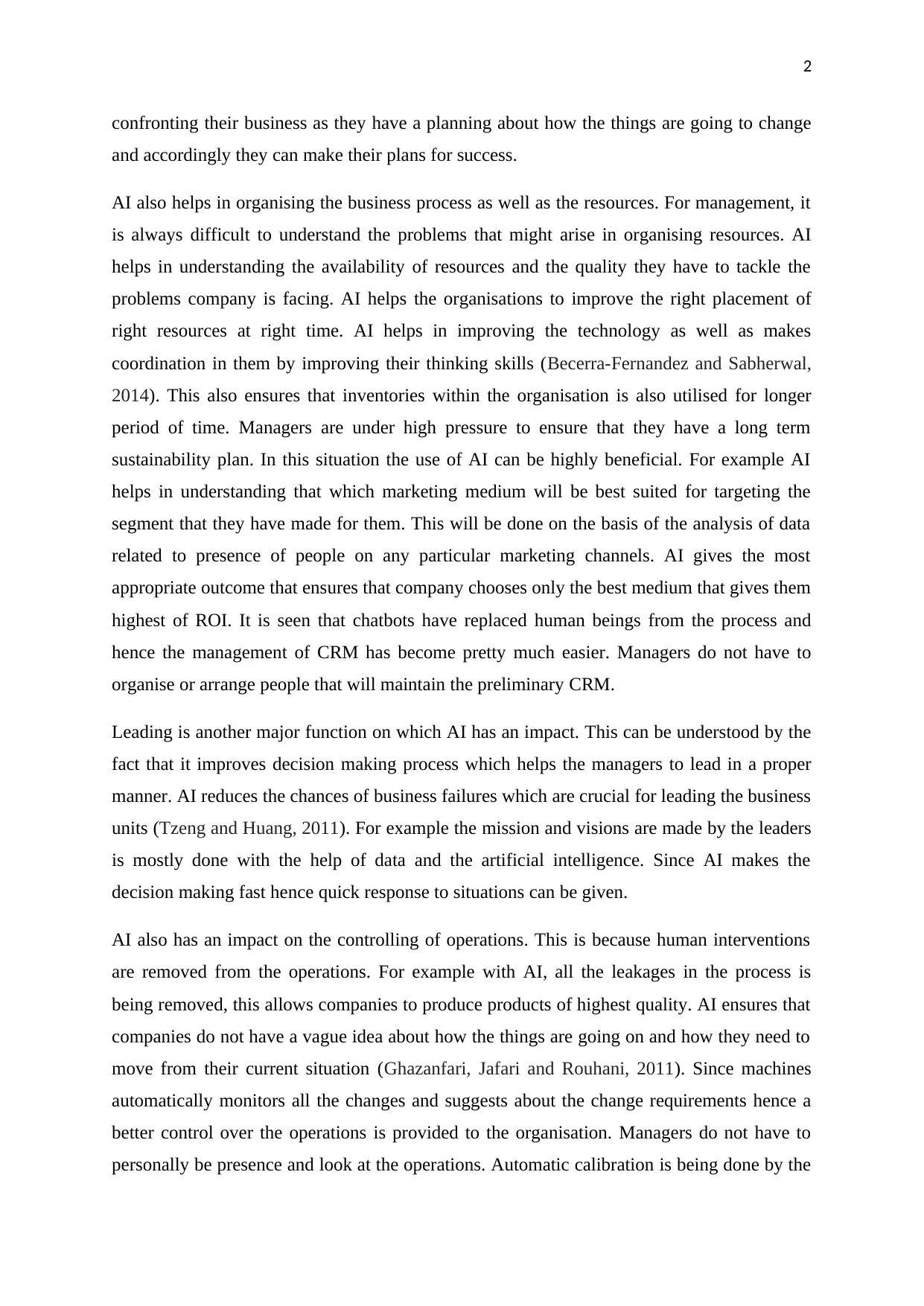
2
confronting their business as they have a planning about how the things are going to change
and accordingly they can make their plans for success.
AI also helps in organising the business process as well as the resources. For management, it
is always difficult to understand the problems that might arise in organising resources. AI
helps in understanding the availability of resources and the quality they have to tackle the
problems company is facing. AI helps the organisations to improve the right placement of
right resources at right time. AI helps in improving the technology as well as makes
coordination in them by improving their thinking skills (Becerra-Fernandez and Sabherwal,
2014). This also ensures that inventories within the organisation is also utilised for longer
period of time. Managers are under high pressure to ensure that they have a long term
sustainability plan. In this situation the use of AI can be highly beneficial. For example AI
helps in understanding that which marketing medium will be best suited for targeting the
segment that they have made for them. This will be done on the basis of the analysis of data
related to presence of people on any particular marketing channels. AI gives the most
appropriate outcome that ensures that company chooses only the best medium that gives them
highest of ROI. It is seen that chatbots have replaced human beings from the process and
hence the management of CRM has become pretty much easier. Managers do not have to
organise or arrange people that will maintain the preliminary CRM.
Leading is another major function on which AI has an impact. This can be understood by the
fact that it improves decision making process which helps the managers to lead in a proper
manner. AI reduces the chances of business failures which are crucial for leading the business
units (Tzeng and Huang, 2011). For example the mission and visions are made by the leaders
is mostly done with the help of data and the artificial intelligence. Since AI makes the
decision making fast hence quick response to situations can be given.
AI also has an impact on the controlling of operations. This is because human interventions
are removed from the operations. For example with AI, all the leakages in the process is
being removed, this allows companies to produce products of highest quality. AI ensures that
companies do not have a vague idea about how the things are going on and how they need to
move from their current situation (Ghazanfari, Jafari and Rouhani, 2011). Since machines
automatically monitors all the changes and suggests about the change requirements hence a
better control over the operations is provided to the organisation. Managers do not have to
personally be presence and look at the operations. Automatic calibration is being done by the
confronting their business as they have a planning about how the things are going to change
and accordingly they can make their plans for success.
AI also helps in organising the business process as well as the resources. For management, it
is always difficult to understand the problems that might arise in organising resources. AI
helps in understanding the availability of resources and the quality they have to tackle the
problems company is facing. AI helps the organisations to improve the right placement of
right resources at right time. AI helps in improving the technology as well as makes
coordination in them by improving their thinking skills (Becerra-Fernandez and Sabherwal,
2014). This also ensures that inventories within the organisation is also utilised for longer
period of time. Managers are under high pressure to ensure that they have a long term
sustainability plan. In this situation the use of AI can be highly beneficial. For example AI
helps in understanding that which marketing medium will be best suited for targeting the
segment that they have made for them. This will be done on the basis of the analysis of data
related to presence of people on any particular marketing channels. AI gives the most
appropriate outcome that ensures that company chooses only the best medium that gives them
highest of ROI. It is seen that chatbots have replaced human beings from the process and
hence the management of CRM has become pretty much easier. Managers do not have to
organise or arrange people that will maintain the preliminary CRM.
Leading is another major function on which AI has an impact. This can be understood by the
fact that it improves decision making process which helps the managers to lead in a proper
manner. AI reduces the chances of business failures which are crucial for leading the business
units (Tzeng and Huang, 2011). For example the mission and visions are made by the leaders
is mostly done with the help of data and the artificial intelligence. Since AI makes the
decision making fast hence quick response to situations can be given.
AI also has an impact on the controlling of operations. This is because human interventions
are removed from the operations. For example with AI, all the leakages in the process is
being removed, this allows companies to produce products of highest quality. AI ensures that
companies do not have a vague idea about how the things are going on and how they need to
move from their current situation (Ghazanfari, Jafari and Rouhani, 2011). Since machines
automatically monitors all the changes and suggests about the change requirements hence a
better control over the operations is provided to the organisation. Managers do not have to
personally be presence and look at the operations. Automatic calibration is being done by the
⊘ This is a preview!⊘
Do you want full access?
Subscribe today to unlock all pages.

Trusted by 1+ million students worldwide
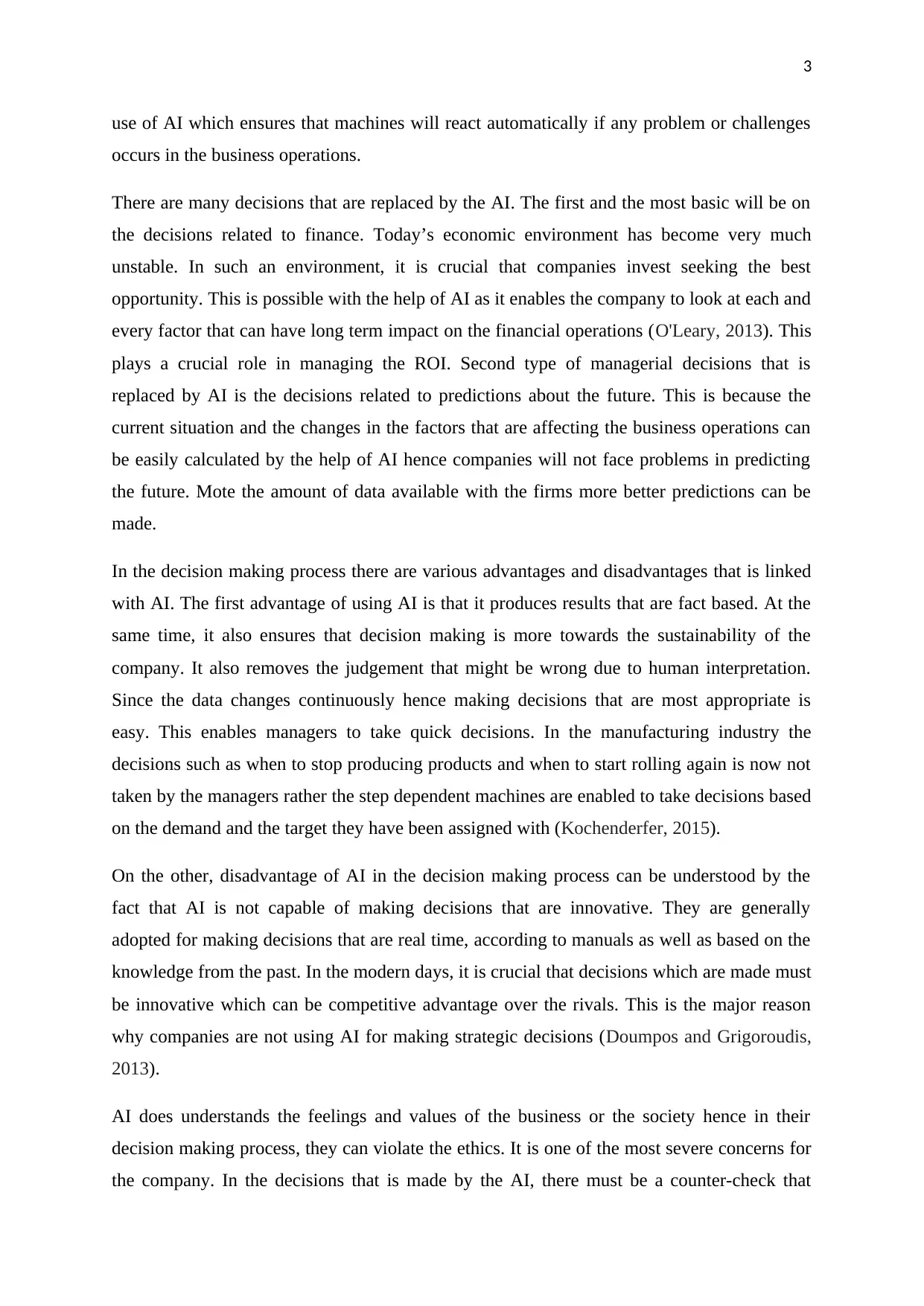
3
use of AI which ensures that machines will react automatically if any problem or challenges
occurs in the business operations.
There are many decisions that are replaced by the AI. The first and the most basic will be on
the decisions related to finance. Today’s economic environment has become very much
unstable. In such an environment, it is crucial that companies invest seeking the best
opportunity. This is possible with the help of AI as it enables the company to look at each and
every factor that can have long term impact on the financial operations (O'Leary, 2013). This
plays a crucial role in managing the ROI. Second type of managerial decisions that is
replaced by AI is the decisions related to predictions about the future. This is because the
current situation and the changes in the factors that are affecting the business operations can
be easily calculated by the help of AI hence companies will not face problems in predicting
the future. Mote the amount of data available with the firms more better predictions can be
made.
In the decision making process there are various advantages and disadvantages that is linked
with AI. The first advantage of using AI is that it produces results that are fact based. At the
same time, it also ensures that decision making is more towards the sustainability of the
company. It also removes the judgement that might be wrong due to human interpretation.
Since the data changes continuously hence making decisions that are most appropriate is
easy. This enables managers to take quick decisions. In the manufacturing industry the
decisions such as when to stop producing products and when to start rolling again is now not
taken by the managers rather the step dependent machines are enabled to take decisions based
on the demand and the target they have been assigned with (Kochenderfer, 2015).
On the other, disadvantage of AI in the decision making process can be understood by the
fact that AI is not capable of making decisions that are innovative. They are generally
adopted for making decisions that are real time, according to manuals as well as based on the
knowledge from the past. In the modern days, it is crucial that decisions which are made must
be innovative which can be competitive advantage over the rivals. This is the major reason
why companies are not using AI for making strategic decisions (Doumpos and Grigoroudis,
2013).
AI does understands the feelings and values of the business or the society hence in their
decision making process, they can violate the ethics. It is one of the most severe concerns for
the company. In the decisions that is made by the AI, there must be a counter-check that
use of AI which ensures that machines will react automatically if any problem or challenges
occurs in the business operations.
There are many decisions that are replaced by the AI. The first and the most basic will be on
the decisions related to finance. Today’s economic environment has become very much
unstable. In such an environment, it is crucial that companies invest seeking the best
opportunity. This is possible with the help of AI as it enables the company to look at each and
every factor that can have long term impact on the financial operations (O'Leary, 2013). This
plays a crucial role in managing the ROI. Second type of managerial decisions that is
replaced by AI is the decisions related to predictions about the future. This is because the
current situation and the changes in the factors that are affecting the business operations can
be easily calculated by the help of AI hence companies will not face problems in predicting
the future. Mote the amount of data available with the firms more better predictions can be
made.
In the decision making process there are various advantages and disadvantages that is linked
with AI. The first advantage of using AI is that it produces results that are fact based. At the
same time, it also ensures that decision making is more towards the sustainability of the
company. It also removes the judgement that might be wrong due to human interpretation.
Since the data changes continuously hence making decisions that are most appropriate is
easy. This enables managers to take quick decisions. In the manufacturing industry the
decisions such as when to stop producing products and when to start rolling again is now not
taken by the managers rather the step dependent machines are enabled to take decisions based
on the demand and the target they have been assigned with (Kochenderfer, 2015).
On the other, disadvantage of AI in the decision making process can be understood by the
fact that AI is not capable of making decisions that are innovative. They are generally
adopted for making decisions that are real time, according to manuals as well as based on the
knowledge from the past. In the modern days, it is crucial that decisions which are made must
be innovative which can be competitive advantage over the rivals. This is the major reason
why companies are not using AI for making strategic decisions (Doumpos and Grigoroudis,
2013).
AI does understands the feelings and values of the business or the society hence in their
decision making process, they can violate the ethics. It is one of the most severe concerns for
the company. In the decisions that is made by the AI, there must be a counter-check that
Paraphrase This Document
Need a fresh take? Get an instant paraphrase of this document with our AI Paraphraser
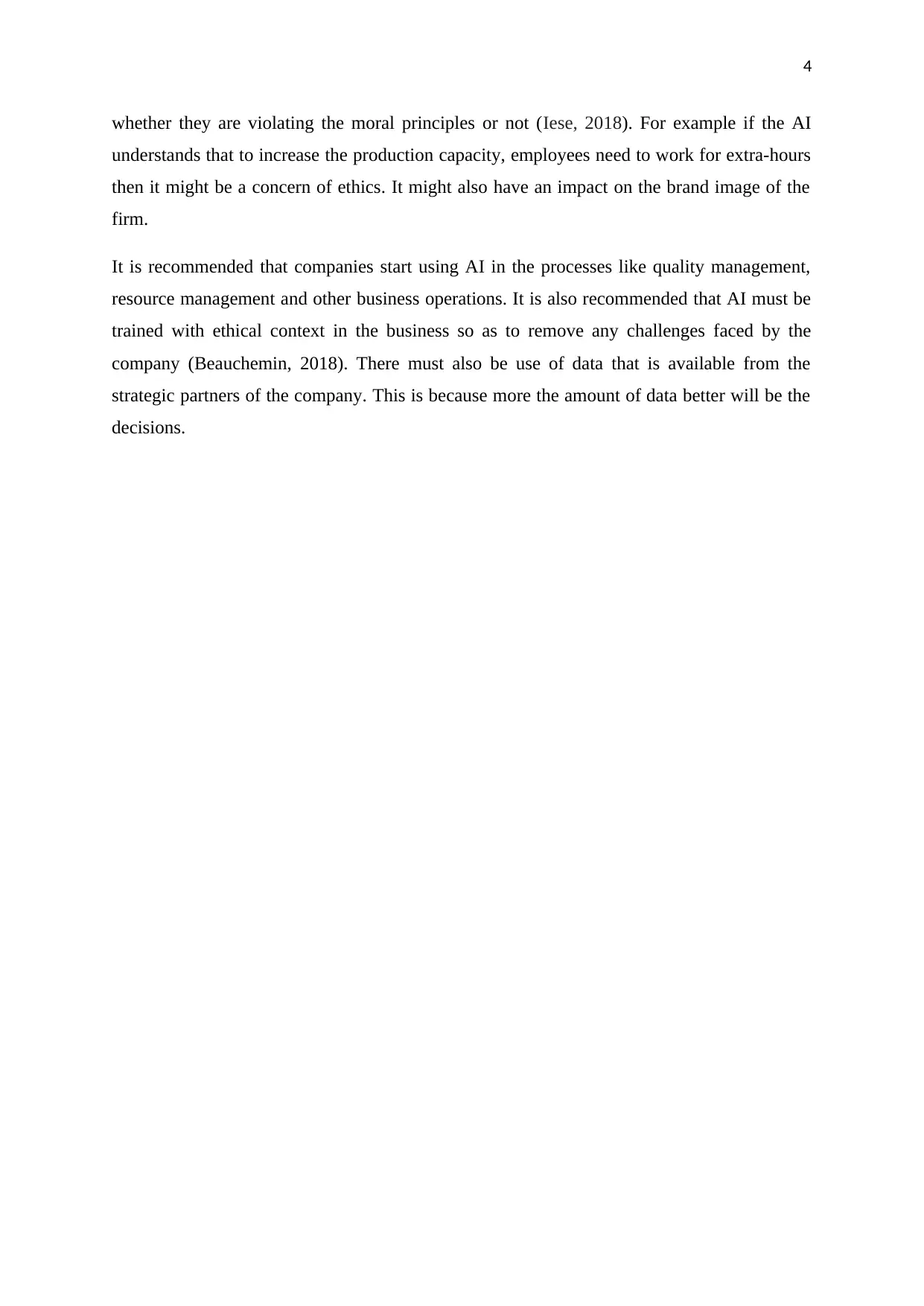
4
whether they are violating the moral principles or not (Iese, 2018). For example if the AI
understands that to increase the production capacity, employees need to work for extra-hours
then it might be a concern of ethics. It might also have an impact on the brand image of the
firm.
It is recommended that companies start using AI in the processes like quality management,
resource management and other business operations. It is also recommended that AI must be
trained with ethical context in the business so as to remove any challenges faced by the
company (Beauchemin, 2018). There must also be use of data that is available from the
strategic partners of the company. This is because more the amount of data better will be the
decisions.
whether they are violating the moral principles or not (Iese, 2018). For example if the AI
understands that to increase the production capacity, employees need to work for extra-hours
then it might be a concern of ethics. It might also have an impact on the brand image of the
firm.
It is recommended that companies start using AI in the processes like quality management,
resource management and other business operations. It is also recommended that AI must be
trained with ethical context in the business so as to remove any challenges faced by the
company (Beauchemin, 2018). There must also be use of data that is available from the
strategic partners of the company. This is because more the amount of data better will be the
decisions.
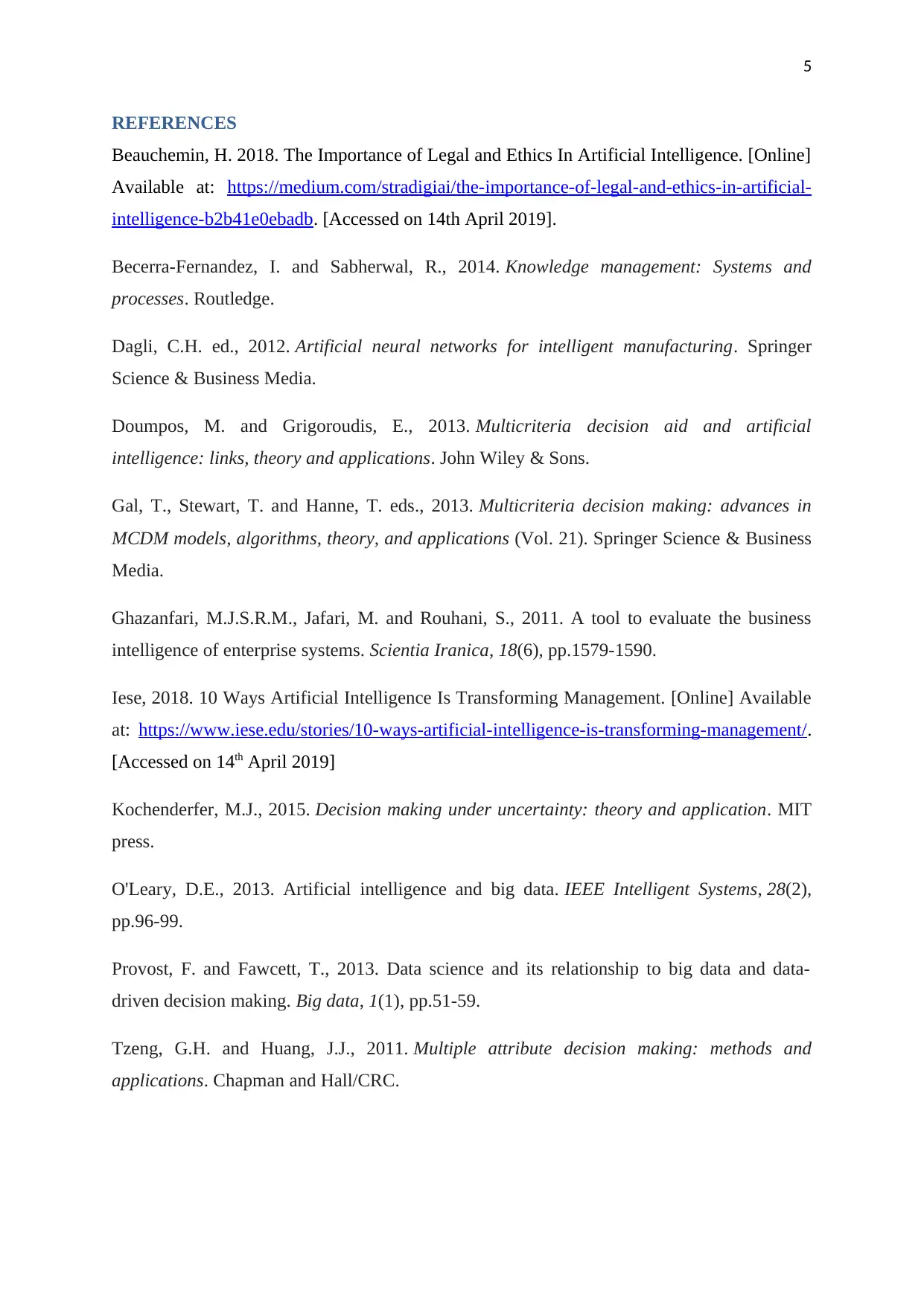
5
REFERENCES
Beauchemin, H. 2018. The Importance of Legal and Ethics In Artificial Intelligence. [Online]
Available at: https://medium.com/stradigiai/the-importance-of-legal-and-ethics-in-artificial-
intelligence-b2b41e0ebadb. [Accessed on 14th April 2019].
Becerra-Fernandez, I. and Sabherwal, R., 2014. Knowledge management: Systems and
processes. Routledge.
Dagli, C.H. ed., 2012. Artificial neural networks for intelligent manufacturing. Springer
Science & Business Media.
Doumpos, M. and Grigoroudis, E., 2013. Multicriteria decision aid and artificial
intelligence: links, theory and applications. John Wiley & Sons.
Gal, T., Stewart, T. and Hanne, T. eds., 2013. Multicriteria decision making: advances in
MCDM models, algorithms, theory, and applications (Vol. 21). Springer Science & Business
Media.
Ghazanfari, M.J.S.R.M., Jafari, M. and Rouhani, S., 2011. A tool to evaluate the business
intelligence of enterprise systems. Scientia Iranica, 18(6), pp.1579-1590.
Iese, 2018. 10 Ways Artificial Intelligence Is Transforming Management. [Online] Available
at: https://www.iese.edu/stories/10-ways-artificial-intelligence-is-transforming-management/.
[Accessed on 14th April 2019]
Kochenderfer, M.J., 2015. Decision making under uncertainty: theory and application. MIT
press.
O'Leary, D.E., 2013. Artificial intelligence and big data. IEEE Intelligent Systems, 28(2),
pp.96-99.
Provost, F. and Fawcett, T., 2013. Data science and its relationship to big data and data-
driven decision making. Big data, 1(1), pp.51-59.
Tzeng, G.H. and Huang, J.J., 2011. Multiple attribute decision making: methods and
applications. Chapman and Hall/CRC.
REFERENCES
Beauchemin, H. 2018. The Importance of Legal and Ethics In Artificial Intelligence. [Online]
Available at: https://medium.com/stradigiai/the-importance-of-legal-and-ethics-in-artificial-
intelligence-b2b41e0ebadb. [Accessed on 14th April 2019].
Becerra-Fernandez, I. and Sabherwal, R., 2014. Knowledge management: Systems and
processes. Routledge.
Dagli, C.H. ed., 2012. Artificial neural networks for intelligent manufacturing. Springer
Science & Business Media.
Doumpos, M. and Grigoroudis, E., 2013. Multicriteria decision aid and artificial
intelligence: links, theory and applications. John Wiley & Sons.
Gal, T., Stewart, T. and Hanne, T. eds., 2013. Multicriteria decision making: advances in
MCDM models, algorithms, theory, and applications (Vol. 21). Springer Science & Business
Media.
Ghazanfari, M.J.S.R.M., Jafari, M. and Rouhani, S., 2011. A tool to evaluate the business
intelligence of enterprise systems. Scientia Iranica, 18(6), pp.1579-1590.
Iese, 2018. 10 Ways Artificial Intelligence Is Transforming Management. [Online] Available
at: https://www.iese.edu/stories/10-ways-artificial-intelligence-is-transforming-management/.
[Accessed on 14th April 2019]
Kochenderfer, M.J., 2015. Decision making under uncertainty: theory and application. MIT
press.
O'Leary, D.E., 2013. Artificial intelligence and big data. IEEE Intelligent Systems, 28(2),
pp.96-99.
Provost, F. and Fawcett, T., 2013. Data science and its relationship to big data and data-
driven decision making. Big data, 1(1), pp.51-59.
Tzeng, G.H. and Huang, J.J., 2011. Multiple attribute decision making: methods and
applications. Chapman and Hall/CRC.
⊘ This is a preview!⊘
Do you want full access?
Subscribe today to unlock all pages.

Trusted by 1+ million students worldwide

6
1 out of 7
Related Documents
Your All-in-One AI-Powered Toolkit for Academic Success.
+13062052269
info@desklib.com
Available 24*7 on WhatsApp / Email
![[object Object]](/_next/static/media/star-bottom.7253800d.svg)
Unlock your academic potential
Copyright © 2020–2026 A2Z Services. All Rights Reserved. Developed and managed by ZUCOL.





